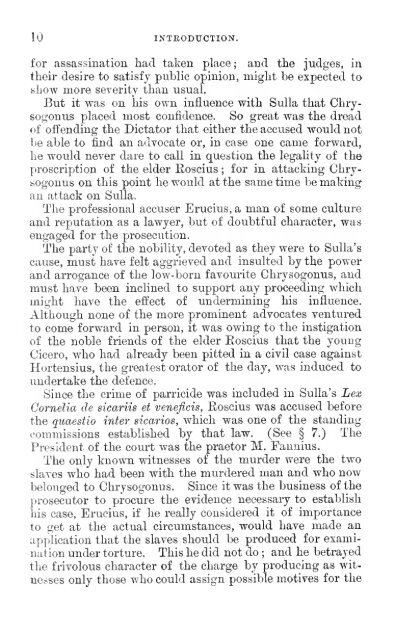Pro S. Roscio Amerino
Pro S. Roscio Amerino
Pro S. Roscio Amerino
Create successful ePaper yourself
Turn your PDF publications into a flip-book with our unique Google optimized e-Paper software.
10 INTRODUCTION.<br />
for assassination had taken place ; and tlie judges, in<br />
their desire to satisfy public opinion, might be expected to<br />
show more severity than usuaL<br />
But it was on his own influence with Sulla that Chrysogonus<br />
placed most confidence. So great was the dread<br />
of oifending the Dictator that either the accused would not<br />
l)e able to find an advocate or, in case one came forward,<br />
lie would never dare to call in question the legahty of the<br />
proscription of the elder Eoscius ; for in attaching Chrysogonus<br />
on this point lie would at the same time be making<br />
an attack on SuUa.<br />
The professional accuser Erucius, a man of some culture<br />
and reputation as a lawyer, but of doubtful character, was<br />
engaged for the prosecution.<br />
The party of the nobility, devoted as they were to Sulla's<br />
cause, must have felt aggrieved and insulted by the power<br />
and ai-rogance of the low-born favo\u-ite Chrysogonus, aud<br />
must have been inclined to support any proceeding which<br />
raight have the effect of undermining his influence.<br />
Although none of the more prominent advocates ventured<br />
to come forward in person, it was owing to the instigation<br />
of the noble friends of the elder Eoscius that the youug<br />
Cicero, who had already been pitted in a civil case against<br />
Hortensius, the greatest orator of the day, was induced to<br />
undertake the defence.<br />
Since the crime of parricide was included in Sulla's Lex<br />
Gornelia de sicariis et veneficis, Eoscius was accused before<br />
the quaestio inter sicarios, which was one of the standing<br />
commissions established by that law. (See § 7.) The<br />
President of the court was the praetor M. Fannius.<br />
The only known witnesses of the murder were the two<br />
slaves who had been with the murdered man and who now<br />
belouged to Chrysogonus. Since it was the business of the<br />
prosecutor to procure the evidence necessary to establish<br />
his case, Erucius, if he really considered it of importance<br />
to get at the actual circumstances, would have made an<br />
application that the slaves should be produced for examination<br />
under torture. This he did not do ; and he betrayed<br />
the frivolous character of the charge by producing as witnesses<br />
only those who could assign possible motives for the

















